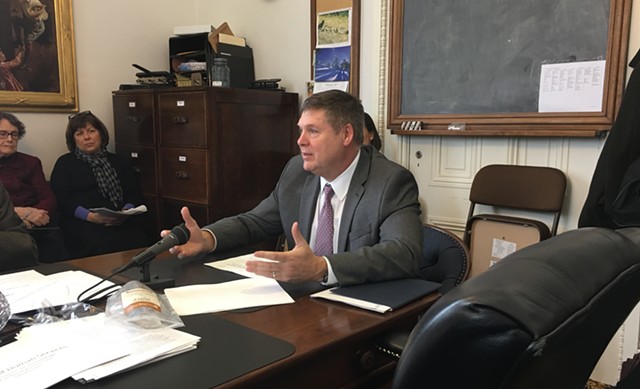
- John Walters
- Human Services Secretary Al Gobeille testifying before the Senate Appropriations Committee
A routine budget hearing before a Senate committee Thursday was sidelined by one seemingly intractable problem: what to do about the state’s troubled, creaky, under-resourced mental health care system. All those assembled were in agreement on one point: none of them have any idea how to fix the damn thing.
Human Services Secretary Al Gobeille provided testimony to the Senate Appropriations Committee on his agency’s fiscal year 2018 budget and got all the way to the seventh chart in
his prepared presentation before the hearing stalled.
The chart showed trends in state funding for “Designated Agencies and Specialized Service Agencies,” which are nonprofit organizations that provide mental health, substance abuse and disability-related services under contract with the state of Vermont. They are generally referred to as “designated agencies.”
Gobeille and the assembled senators were fully aware that the agencies are woefully underfunded and on the brink of collapse. Wages for designated agency staffers have been essentially stagnant for years, leading to chronic recruitment problems and a shockingly high staff turnover rate — 27.5 percent annually for the past three consecutive years, according to
a white paper from Vermont Care Partners, a network of the state’s designated agencies.
“The Agency of Human Services intends to do a deep dive into mental health,” Gobeille told the panel, “especially the designated agencies and the Middlesex facility,” which provides seven beds for psychiatric patients.
It was meant to be temporary; the state’s agreement with the town of Middlesex expires in one year, and the town appears unlikely to grant an extension.
Gobeille’s statement opened the door to a general discussion of the entire mental health system, littered with comments like this:
“We have not funded the designated agencies sufficiently,” said Sen. Dick Sears (D-Bennington).
“The [designated] agencies are serving more and more violent people, and the staff feels unsafe,” noted Sen. Richard Westman (R-Lamoille).
“The legislature has been speaking inconsistently on mental health issues,” said Sears. “It’s troubling to me.”
“The system is in crisis,” said committee chair Jane Kitchel (D-Caledonia). She then pondered whether Vermont truly has a “system” at all, or just disconnected pieces of one.
“We aren’t in a position to evaluate the system and make recommendations,” she continued. That’s a remarkable statement coming from a 12-year senator who previously served as Human Services secretary herself.
If someone with her credentials can’t evaluate the system, and isn’t even sure a system exists, there’s real trouble.
“This is a multifaceted community-based problem,” said Gobeille. “We have to come together quickly and define what we need.”
He hopes to stretch dollars further and improve services (and staff morale) by improving the “flow” between all parts of the system, from inpatient facilities to designated agencies. Rather than try to invest money in one specific area, such as inpatient beds, Gobeille wants to identify block-points and bottlenecks throughout the system.
The discussion ended on a note of mutual frustration. No answers were to be had; all that’s left is to undertake a massive review of the entire system with a goal of identifying trouble spots that can be fixed on the cheap. If that works out, the result would be a better-functioning system that costs no more than the current mess.
It won’t get fixed this year. Gobeille’s budget, or some form of it, will go through the legislature before he can possibly complete his “deep dive” and identify the solutions he can only hope to find.











Comments (3)
Showing 1-3 of 3
Comments are closed.
From 2014-2020, Seven Days allowed readers to comment on all stories posted on our website. While we've appreciated the suggestions and insights, right now Seven Days is prioritizing our core mission — producing high-quality, responsible local journalism — over moderating online debates between readers.
To criticize, correct or praise our reporting, please send us a letter to the editor or send us a tip. We’ll check it out and report the results.
Online comments may return when we have better tech tools for managing them. Thanks for reading.